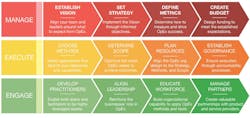Operational Excellence: Business Function or Core Capability?
A common model used to describe the transition that takes place anytime someone learns and applies a new skill is the four stages of competence. If you’re unfamiliar with the model, I’ll describe it briefly with a simple example weaved throughout to illustrate each stage:
Stage 1: Unconscious incompetence – the learner is not aware that he lacks a certain skill. As an example, a young child is not innately aware that he needs to regularly brush his teeth nor is he automatically capable of doing it well without instruction.
Stage 2: Conscious incompetence – the learner is aware that the skill is lacking, but does not possess the skill. Returning to the teeth brushing example, once the parent explains the need to brush teeth regularly, the child now knows that it should be done but has not yet learned how to put toothpaste on the brush or how to brush teeth properly.
Stage 3: Conscious competence - the learner can perform the skill, but needs to make a conscious effort to do so and may lose the skill if he does not continue to apply it. Back to teeth brushing, at this stage the parent needs to observe the child brushing his teeth to ensure it’s done properly and likely needs to remind the child each morning and evening to do so.
Stage 4: Unconscious competence – the skill has become “second nature” to the learner and is applied appropriately in just about every relevant circumstance. Children demonstrate unconscious competence in teeth brushing when they do it properly without thinking about it and know to brush their teeth without being reminded.
When it comes to operational excellence (OpEx), the competence model can certainly be applied on a micro-level, such as performing a proper gemba walk or conducting 5-Why problem solving, as well as a macro-level; namely, getting a focus on waste elimination and continuous improvement embedded into the cultural DNA of the organization. The point is that, whether referring to the micro or the macro, in virtually all situations Stage 4 – unconscious competence – is the goal. This is what is meant when people say that they want OpEx to be a “core capability” of the organization.
Unfortunately, many in the OpEx community are doing themselves and their organizations a disservice because their efforts to make OpEx a core capability of the business are being hampered by the lack of effectiveness with which they manage the OpEx function.
Let’s back up a second and make sure that we’re clear on terms. The website businessdictionary.com defines a business function as “a process or operation that is performed routinely to carry out a part of the mission of an organization.” Typical characteristics of a business function include common roles and responsibilities, a leadership structure and staffing model, and a budget. Businessdictionary.com defines a capability as the “measure of the ability of an entity (department, organization, person, system) to achieve its objectives, especially in relation to its overall mission.” As explained in the definition, a capability can be demonstrated by an individual or across an entire organization.
The point I want to make is that these two terms are not mutually exclusive. For example, sales is both a function of the business and a capability that someone can demonstrate. Yet when we talk about OpEx as a function – its role in the business and overall effectiveness – some OpEx leaders and practitioners tend to get uncomfortable and deflect the discussion. The response may go something like this; “we see ourselves not as a function within the organization but as an enabler of excellence for the rest of the organization” or “at our company, we think of OpEx as everyone’s job, so we try to avoid drawing functional boundaries.” Put another way, there’s a de-emphasis on the importance of the function because of concern that the larger goal – to make OpEx a core capability for everyone – will get marginalized.
However, while this underlying concern has validity – there is always risk that employees will look at OpEx as only the job of the functional specialists – the reality is that for virtually all large organizations whether we like it or not OpEx is both a business function that needs to be strategically managed and a core capability that needs to be developed. In fact, the relationship is symbiotic…if the function is well-managed, then the likelihood of success in driving OpEx as a core capability is greatly enhanced.
On the other hand, if the role and overall importance of the function is deemphasized, then the success of the entire OpEx effort is placed at significant risk in several ways, including.
- Low awareness among other business and functional leaders on the vision and strategy for OpEx and how the OpEx function will support that vision and strategy, leading to pockets of the organization “opting out” of the process or otherwise not engaging as they should
- A lack of clarity on the roles and responsibilities of OpEx practitioners relative to the rest of the organization, which leads to improper utilization of scarce resources
- The expected and actual value (financial, operational, and cultural) that OpEx provides to the broader organization is never fully clarified, leading to a recurring need to justify its existence and/or difficulty in making the case for additional resources
The good news is that these risks can be significantly mitigated or eliminated entirely through sound and effective management. Unfortunately, data indicates that many organizations aren’t doing what’s necessary to address these risks. We recently deployed an OpEx effectiveness assessment to help companies gauge the extent to which they are strategically managing OpEx in their organization. The 53 binary (i.e., yes-no) question assessment looks across 12 elements broken into 3 categories – Manage, Execute, and Engage – as shown in the image below:
Sample questions asked in the assessment include:
- Have you developed or updated within the last 12 months a compelling vision for OpEx aligned with the overall corporate vision?
- Have you developed a core set of strategic objectives for OpEx that align with the OpEx vision and larger business strategy?
- Has the organization defined a resourcing plan for the OpEx function?
- Have you conducted a stakeholder analysis to better assess which stakeholders will have a high potential impact on the future success of OpEx in the organization as well as those stakeholders who are likely to be resistant to the OpEx vision and strategy?
- Has your organization developed a workforce training program to support the application of OpEx?
The early results from this assessment strongly indicate that there’s lots of opportunity to improve. The affirmative response rate (i.e., the percent of “yes” responses) across all companies is only 52%. In other words, we’re only doing about ½ of what we need to do to strategically manage all aspects of OpEx within the organization. Dimensions of particular concern include leadership alignment – a 26% affirmative response rate – and metrics definition – a 28% affirmative response rate. Returning to the risks stated above for a moment, if OpEx leaders aren’t proactive in educating and aligning other business and functional leaders on the vision and strategy for OpEx and haven’t established clear functional success metrics, then the function will struggle to gain acceptance and justify its value.
The takeaway is that we in the OpEx community need to take our own medicine a bit by applying the same level of rigor and discipline to the way we manage our function as we would expect from other functions in the business. For example, we would expect the HR function to have a set of functional strategic objectives that align to the overall business objectives. Likewise, we’d expect the sales function to have key performance indicators that map to the corporate KPIs. And we’d certainly hope that the IT function has a resource model that allows it to meet projected demand for IT support.
These practices – strategy setting, resource planning, budgeting, governance, team development, etc. – exist for a reason; namely to drive overall organizational focus and alignment in order to increase the likelihood that the business will be successful. To ignore their application for the OpEx function is to introduce risk into the journey toward the ultimate goal…operational excellence as a core capability of the entire organization.
Roger Price is CEO of Phase 5 Group LLC with accountability for all aspects of the business – sales and marketing, product development, and client relationship management. He also serves on the board of directors for Phase 5 Group LLC.


